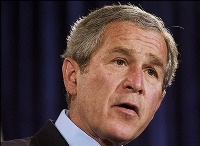George W. Bush to veto stem cell issue
President George W. Bush has chosen to use his veto pen three times twice on the stem cell issue where U.S. politics, ethics and science collide.

Pushing back against the Democratic-led Congress, Bush plans to veto a bill Wednesday that would have eased restraints on federally funded embryonic stem cell research. At the same time, the White House said Bush will issue an executive order directing the Health and Human Services Department to promote research into cells that like human embryonic stem cells also hold the potential of regenerating into different types of cells that might be used to battle disease.
Democrats, who have made the stem cell legislation Bush promised to veto a top priority when they took control of the House and Senate in January, were quick to denounce the president's decision.
"This is just one example of how the president puts ideology before science, politics before the needs of our families, just one more example of how out of touch with reality he and his party have become," Sen. Hillary Rodham Clinton, a Democratic presidential candidate, told the Take Back America conference of liberal activists Wednesday.
Senate Majority Leader Harry Reid is expected to schedule an override vote, but the date has not been set. Democrats, however, currently do not have enough votes to override Bush's veto.
In his veto threat, the president accused Democrats of recycling an old measure that he already vetoed and argued that the bill would mean American taxpayers would for the first time be compelled to support the deliberate destruction of human embryos.
"The president supports and encourages stem cell research, including using embryonic lines, as long as it does not involve creating, harming or destroying embryos," White House spokesman Tony Fratto said. "That is an ethical line that should not be crossed."
No new funding is being announced, but Bush will outline an initiative that could in the future make federal funding available for research on additional "pluripotent" stem cells ones that can give rise to any kind of cell in the body except those required to develop a fetus.
The National Institutes of Health says these stem cells offer the prospect of having a renewable source of replacement cells and tissues to treat Parkinson's and Alzheimer's diseases, spinal cord injury, stroke, burns, heart disease, diabetes, osteoarthritis and rheumatoid arthritis and other conditions.
The executive order Bush is signing will expand the NIH embryonic stem cell registry to include all types of "ethically produced" stem cells, the White House said. It also will encourage scientists to work with NIH to add new "ethically derived" stem cell lines to the list of those eligible for federal funding, based on new research coming forward.
Scientists were first able to conduct research with embryonic stem cells in 1998, the NIH says. There were no federal funds for the work until Bush announced on Aug. 9, 2001, that his administration would make the funds available for lines of cells that already were in existence.
Currently, states and private organizations are permitted to fund embryonic stem cell research, but federal support is limited to cells that existed as of Aug. 9, 2001. The latest bill was aimed at lifting that restriction.
The science aside, the issue has weighty political and ethical implications.
Public opinion polls show strong support for the research, and it could return as an issue in the 2008 elections.
This will be the third veto of Bush's presidency. His first occurred last year when he rejected legislation to allow funding of additional lines of embryonic stem cells a measure that passed over the objections of Republicans then in control. The second legislation he vetoed would have set timetables for U.S. troop withdrawals from Iraq.
Subscribe to Pravda.Ru Telegram channel, Facebook, RSS!


